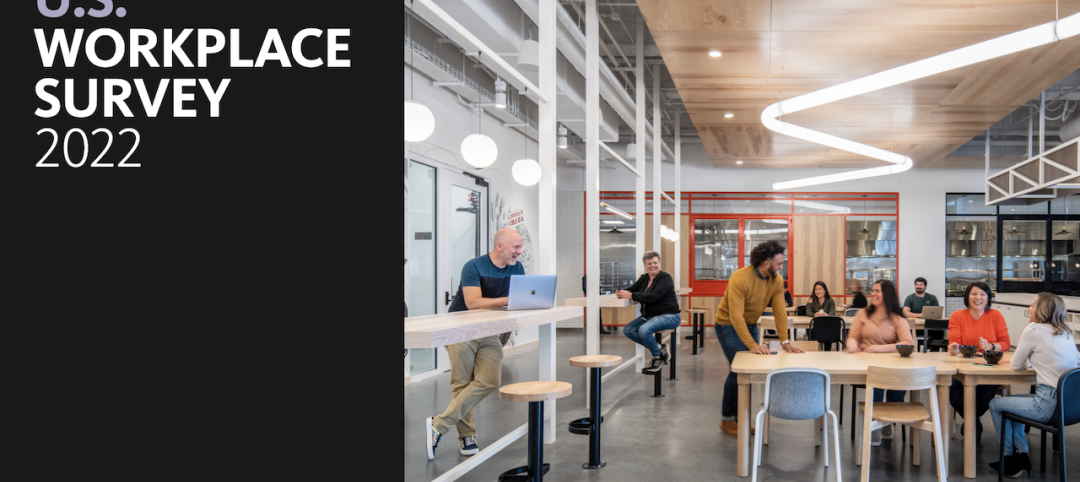The Green Building Initiative (GBI) today announced the launch of a new certification program specific to design of interiors of commercial and institutional buildings, according to GBI president Jerry Yudelson.
The new program, Green Globes for Sustainable Interiors, focuses exclusively on the sustainable design and construction of interior spaces in non-residential buildings and can be pursued by both building owners and individual lessees of commercial spaces. When pursuing Green Globes for Sustainable Interiors certification, tenants can focus on both designing new and/or improving their existing interior space to Green Globes standards without the need to certify an entire building.
“One of the aspects that makes Green Globes for Sustainable Interiors so versatile–and practical–is that it enables tenants to certify the specific environmental and sustainability attributes of the space they lease,” Yudelson said. “Other certifications include aspects of the entire building and surroundings, and as a result, tenant improvements can be penalized for conditions they do not control.”
As with all Green Globes rating programs, Green Globes for Sustainable Interiors utilizes a third-party assessor who reviews actual building characteristics and documentation. However, Green Globes for Sustainable Interiors has no prerequisites, which – if required – could unfairly penalize building projects and possibly result in their inability to use a green building rating system. The Green Globes for Sustainable Interiors program requires that interior designers and tenant project teams address only those sustainability criteria within their “domain of influence.”
The Green Globes 1,000-point scale utilizes weighted criteria; the assigned number of points for individual criteria reflects their relative impact and/or benefit to sustainability of the tenant improvements. Green Globes for Sustainable Interiors includes six environmental assessment areas: Project Management, Energy, Water, Materials & Resources, Emissions and Other Impacts, and Indoor Environment.
In addition to assessing all elements of an interiors project, Green Globes for Sustainable Interiors emphasizes the key performance indicators (KPIs) of energy, materials and indoor environment. Green Globes for Sustainable Interiors does not deal with site characteristics, instead focusing all criteria on parameters within the scope of a typical tenant improvement, resulting in lower costs for certification.
Similar to the Green Globes for New Constuction program, Green Globes for Sustainable Interiors includes a dual-pathway approach to materials choices for interior fit-outs, utilizing either lifecycle assessment (LCA) or Environmental Product Declarations (EPDs). Interior designers are rewarded for using multi-purpose furniture, modular furniture and casework solutions, and other interior fit-out elements that can be easily reconfigured. Additional points are awarded for reuse of existing interior fit-outs, including finishes, furnishings, and other non-structural elements. The Green Globes for Sustainable Interiors rating system also includes direct reference to other industry standards such as the new “level” sustainability standard of the Business and Institutional Furniture Manufacturers Association (BIFMA).
“The Green Globes for Sustainable Interiors program will be especially attractive to tenants who want to improve their workspace sustainability in situations where a landlord does not plan to address changes in other tenant or common spaces,” Yudelson said.
For more information on Green Globes for Sustainable Interiors visit http://www.thegbi.org/green-globes/sustainable-interiors.shtml, or download a PDF on the program here: http://thegbi.org/URL
About the Green Building Initiative
The GBI is a nonprofit organization and American National Standards Institute (ANSI) Standards Developer dedicated to accelerating the adoption of green building practices. Founded in 2004, the organization is the sole U.S. provider of the Green Globes® and federal GBI Guiding Principles Compliance building certification programs. To learn more about opportunities to become involved in the GBI, contact Jerry Yudelson or visit the GBI website, www.thegbi.org.
Related Stories
Green Renovation | Mar 5, 2023
Dept. of Energy offers $22 million for energy efficiency and building electrification upgrades
The Buildings Upgrade Prize (Buildings UP) sponsored by the U.S. Department of Energy is offering more than $22 million in cash prizes and technical assistance to teams across America. Prize recipients will be selected based on their ideas to accelerate widespread, equitable energy efficiency and building electrification upgrades.
Windows and Doors | Mar 5, 2023
2022 North American Fenestration Standard released
The 2022 edition of AAMA/WDMA/CSA 101/I.S.2/A440, “North American Fenestration Standard/Specification for windows, doors, and skylights” (NAFS) has been published. The updated 2022 standard replaces the 2017 edition, part of a continued evolution of the standard to improve harmonization across North America, according to a news release.
AEC Innovators | Mar 3, 2023
Meet BD+C's 2023 AEC Innovators
More than ever, AEC firms and their suppliers are wedding innovation with corporate responsibility. How they are addressing climate change usually gets the headlines. But as the following articles in our AEC Innovators package chronicle, companies are attempting to make an impact as well on the integrity of their supply chains, the reduction of construction waste, and answering calls for more affordable housing and homeless shelters. As often as not, these companies are partnering with municipalities and nonprofit interest groups to help guide their production.
Modular Building | Mar 3, 2023
Pallet Shelter is fighting homelessness, one person and modular pod at a time
Everett, Wash.-based Pallet Inc. helped the City of Burlington, Vt., turn a municipal parking lot into an emergency shelter community, complete with 30 modular “sleeping cabins” for the homeless.
Codes | Mar 2, 2023
Biden Administration’s proposed building materials rules increase domestic requirements
The Biden Administration’s proposal on building materials rules used on federal construction and federally funded state and local buildings would significantly boost the made-in-America mandate. In the past, products could qualify as domestically made if at least 55% of the value of their components were from the U.S.
Industry Research | Mar 2, 2023
Watch: Findings from Gensler's latest workplace survey of 2,000 office workers
Gensler's Janet Pogue McLaurin discusses the findings in the firm's 2022 Workplace Survey, based on responses from more than 2,000 workers in 10 industry sectors.
AEC Innovators | Mar 2, 2023
Turner Construction extends its ESG commitment to thwarting forced labor in its supply chain
Turner Construction joins a growing AEC industry movement, inspired by the Design for Freedom initiative, to eliminate forced labor and child labor from the production and distribution of building products.
Multifamily Housing | Mar 1, 2023
Multifamily construction startup Cassette takes a different approach to modular building
Prefabricated modular design and construction have made notable inroads into such sectors as industrial, residential, hospitality and, more recently, office and healthcare. But Dafna Kaplan thinks that what’s held back the modular building industry from even greater market penetration has been suppliers’ insistence that they do everything: design, manufacture, logistics, land prep, assembly, even onsite construction. Kaplan is CEO and Founder of Cassette, a Los Angeles-based modular building startup.
Airports | Feb 28, 2023
Data visualization: $1 billion earmarked for 2023 airport construction projects
Ninety-nine airports across 47 states and two territories are set to share nearly $1 billion in funding in 2023 from the Federal Aviation Administration. The funding is aimed at help airports of all sizes meet growing air travel demand, with upgrades like larger security checkpoints and more reliable and faster baggage systems.
Seismic Design | Feb 27, 2023
Turkey earthquakes provide lessons for California
Two recent deadly earthquakes in Turkey and Syria offer lessons regarding construction practices and codes for California. Lax building standards were blamed for much of the devastation, including well over 35,000 dead and countless building collapses.
















